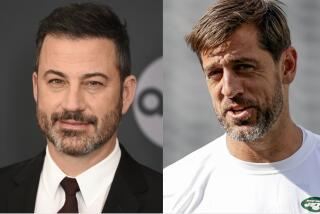NFL Players Groping for Answers : Complex Issue of Drug Testing Has Teams Wondering
CLEVELAND — NFL players, while awaiting an arbitrator’s ruling on the strict drug testing procedures introduced by Commissioner Pete Rozelle in July, nevertheless hope the outcome will prove what they believe is true--that the vast majority are “innocent of drug use.”
Though the focus seems to be on the Cleveland Browns because of the cocaine-induced death of free safety Don Rogers on June 27, barely a week after basketball star Len Bias died of cocaine intoxication, the consensus among many players is that they must remove the stigma that drugs are commonplace in professional sports.
“In a sense, we have to prove that virtually all of us are innocent of drug use,” Cleveland quarterback Bernie Kosar said. “I won’t give a speech of the dangers of drug use because all of us should know better. I just don’t want people saying a guy overthrew a receiver, missed a block or dropped a pass because he’s on drugs. The image of the sport has been tarnished.”
Dallas tight end Doug Cosbie says pro football should not be singled out for drug abuse.
“The NFL, like any other league, mirrors society because it’s part of society,” he said. “There is a drug problem, therefore, in society. You’re always reading about cocaine busts everywhere. When are people going to grow up and be themselves rather than artificially pump themselves up?”
Rogers’ death has had an impact on the Browns, but the team is doing little in terms of memorials. The team has inserted a black-bordered photograph of Rogers in its media guide, and helped organize a service at a Cleveland church. But there will be no black armbands or No. 20’s on the Browns uniforms.
“As much as I loved Don Rogers, I cannot escape the fact that he did something terribly wrong and foolish,” said tight end Ozzie Newsome. “He took drugs willingly and he died.”
Defensive end Howie Long of the Raiders says drug testing “is probably a necessary inconvenience in light of what happened to Rogers.
“The only thing that’s disturbing is that we have to fill up little bottles to prove we’re not on drugs, and people who have other jobs don’t,” he said. “I mean, Joe down at the gas station doesn’t have to submit to urinalysis.”
Tackle Anthony Munoz of Cincinnati understands Long’s objection.
“Sure, this whole thing is a nuisance,” he says. “But on the other hand, we’re professional athletes and we’re paid well to perform well as a group. Part of that committment means keeping yourself in the best possible condition. Obviously, drugs are not part of that.”
Newsome, like many on the Browns, supports drug testing but says the Commissioner’s office should have attempted to negotiate the testing issue.
“I think that would’ve been fairer,” he said. “Sure, we want to rid the sports of drugs. But if we mutually agree on that, why can’t we have the opportunity to reach a mutual agreement on procedures?”
Green Bay wide receiver James Lofton believes that a compromise will be reached.
“I don’t feel there will be a war about drugs when both sides know there should be a war on drugs,” he said. “Cooler heads will prevail.”
Kosar summed up a prevailing though poignant mood.
“It’s a shame that both Don Rogers and Len Bias made fatal mistakes,” he said. “You can’t help but feel badly. But on the other hand, you can’t have our young people read about them as the great athletes they were and ask ‘Were they heroes despite the drugs?’
“The answer must be made clear: no.”
More to Read
Go beyond the scoreboard
Get the latest on L.A.'s teams in the daily Sports Report newsletter.
You may occasionally receive promotional content from the Los Angeles Times.










